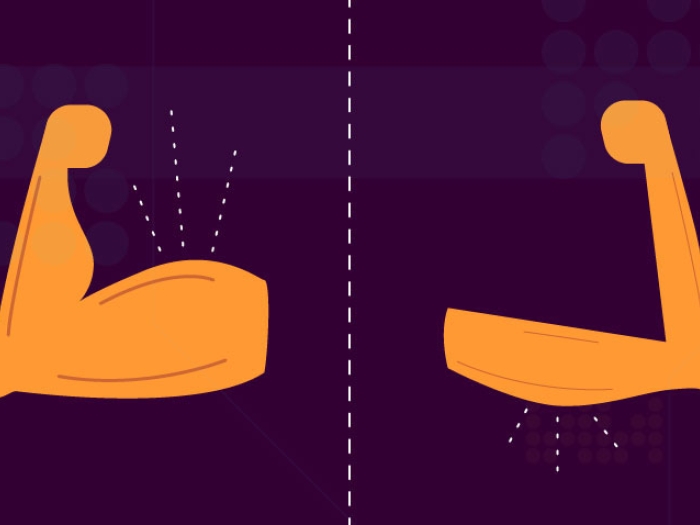A neuromuscular specialist shares helpful facts about symptoms, diagnosis and treatment.
10:23 AM
Author |

In a video posted to Instagram, Grammy-award-winning singer Celine Dion announced that she has a rare condition called stiff person syndrome — and postponed her 2023 European tour.
“While we’re still learning about this rare condition, we now know this is what’s been causing all of the spasms that I’ve been having,” Dion said in the video. “Unfortunately, these spasms affect every aspect of my daily life, sometimes causing difficulties when I walk and not allowing me to use my vocal cords to sing the way I’m used to."
For many people, this was likely the first time they learned of the condition. After all, only around one in 1 million people are diagnosed with stiff person syndrome, said Gary Gallagher, M.D., a neurologist and Co-Neuromuscular Division Chief at University of Michigan Health who treats patients with stiff person syndrome.
Here, Gallagher answers questions for those looking to learn more about the syndrome:
1. What symptoms might precede a stiff person syndrome diagnosis?
Gallagher: The most common symptoms for people with stiff person syndrome are intermittent stiffness or spasms. Sometimes spasms can be confined to one limb, an arm or a leg. More commonly, spasms affect the muscles of the torso or entire body.
SEE ALSO: Myositis: Understanding the Rare Autoimmune Disease
You can have periods where the symptoms are relatively less severe but other times where it is quite painful and can impact the ability to do daily activities like getting dressed, going for a walk or eating a meal. Anxiety or emotional distress are commonly co-occurring symptoms.
Some people may have an exaggerated response to being startled. For example, a loud noise may trigger a series of spasms. Over time, stiffness and spasms can become constant, leading to changes in walking patterns.
2. What causes stiff person syndrome?
Gallagher: Stiff person syndrome is thought to be an autoimmune disease. Many people with the condition have anti-glutamic acid decarboxylase antibodies (GAD Ab). This blood test is not part of the usual blood panels for blood counts or metabolic changes and needs to be ordered separately.
Like Podcasts? Add the Michigan Medicine News Break on Spotify, Apple Podcasts or anywhere you listen to podcasts.
There are times when people with diabetes or thyroid disease have low amounts of the anti-GAD antibody. However, when the GAD levels are quite high, it can help to make the stiff person syndrome diagnosis.
There is also a subset of stiff person syndrome cases that are associated with malignancies, such as breast or lung cancer. Those conditions, known as paraneoplastic syndromes, have different autoantibodies that been described; one is called amphiphysin.
3. How is stiff person syndrome diagnosed?
Gallagher: This is not a common diagnosis. It is estimated that the incidence of this syndrome is about one in 1 million people. It’s possible that there are milder cases that don’t ever come to medical attention or are misdiagnosed. Since it is such a rare condition, many primary care physicians may not be aware of this diagnosis.
Diagnosing stiff person syndrome can be quite a challenge since many more common conditions, such as nonspecific muscle cramps or multiple sclerosis, can cause similar symptoms. The diagnosis may not be considered until the patient has been evaluated by a neurologist or neuromuscular specialist. One characteristic exam finding is rigidity in the muscles. Rigidity is encountered when the examiner passively moves a limb through a full range of motion and there is extra resistance regardless of the speed of that motion. Intermittent muscle cramps won’t cause this type of exam finding.
SEE ALSO: Screening and treatment bring hope for children with spinal muscular atrophy
Some patients will have enlargement in the muscles of their mid-back area. That’s because those muscles are constantly squeezing and stiffening. That may cause people to walk with more of a hunched over gait.
Anti-GAD antibodies are an important part of the diagnosis since markedly elevated levels are characteristic of this condition. Importantly, physicians should have this rare condition in mind for patients who have this stiffness or rigidity on exam.
4. How is stiff person syndrome treated?
Gallagher: Anti-anxiety medications known as benzodiazepines, including diazepam, are commonly used first in the treatment of stiff person syndrome. Many patients with stiff person syndrome respond favorably to this medication. These medications need to be used cautiously since they can cause side effects and may be misused when prescribed for simple muscle cramps. Some patients also respond to muscle relaxants, like baclofen.
However, many patients with stiff person syndrome do not respond fully to medications such as these, and they might require other treatments that modulate the immune system. This might include a set of infusions with IVIG (immunoglobulins that provide feedback to quiet the immune system) or plasma exchange to filter antibodies from the blood.
As with many autoimmune diseases, the longer that stiff person syndrome goes untreated, the more challenging it may be to get symptoms under control. This can be a long-term of a lifelong condition, so it’s important to follow with a provider that can offer that long-term management of the condition.
Live your healthiest life: Get tips from top experts weekly. Subscribe to the Michigan Health blog newsletter
Headlines from the frontlines: The power of scientific discovery harnessed and delivered to your inbox every week. Subscribe to the Michigan Health Lab blog newsletter

Explore a variety of health care news & stories by visiting the Health Lab home page for more articles.

Department of Communication at Michigan Medicine

Want top health & research news weekly? Sign up for Health Lab’s newsletters today!





